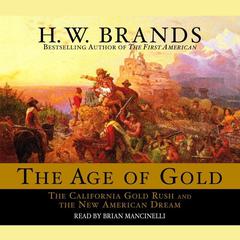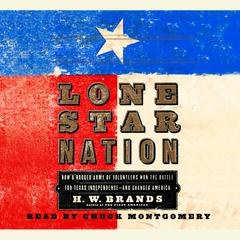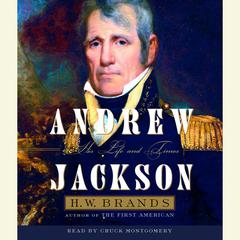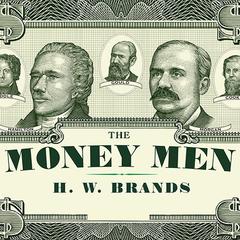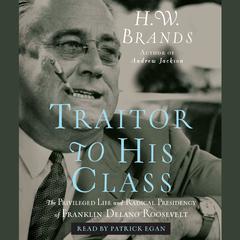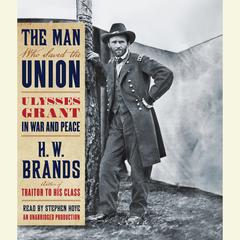 Play Audiobook Sample
Play Audiobook Sample
American Colossus: The Triumph of Capitalism, 1865-1900 Audiobook
 Play Audiobook Sample
Play Audiobook Sample
Quick Stats About this Audiobook
Total Audiobook Chapters:
Longest Chapter Length:
Shortest Chapter Length:
Average Chapter Length:
Audiobooks by this Author:
Publisher Description
In a grand-scale narrative history, the bestselling author of two finalists for the Pulitzer Prize now captures the decades when capitalism was at its most unbridled and a few breathtakingly wealthy businessmen utterly transformed America from an agrarian economy to a world power. The years between the Civil War and the end of the nineteenth century saw the wholesale transformation of America from a land of small farmers and small businessmen into an industrial giant. Driven by unfathomably wealthy and powerful businessmen like J. P. Morgan, Andrew Carnegie and John D. Rockefeller, armies of workers, both male and female, were harnessed to a new vision of massive industry. A society rooted in the soil became one based in cities, and legions of immigrants were drawn to American shores. What’s more, in accomplishing its revolution, capitalism threatened to eclipse American democracy. “What do I care about the law?” bellowed Cornelius Vanderbilt. “Hain’t I got the power?” He did, and with it he and the other capitalists reshaped every aspect of American life. In American Colossus, H.W. Brands portrays the emergence, in a remarkably short time, of a recognizably modern America. The capitalist revolution left not a single area or aspect of American life untouched. It roared across the South, wrenching that region from its feudal past and integrating the southern economy into the national one. It burst over the West, dictating the destruction of Native American economies and peoples, driving the exploitation of natural resources, and making the frontier of settlement a business frontier as well. It crashed across the urban landscape of the East and North, turning cities into engines of wealth and poverty, opulence and squalor. It swamped the politics of an earlier era, capturing one major party and half of the other, inspiring the creation of a third party and determining the issues over which all three waged some of the bitterest battles in American history. Brands’s spellbinding narrative beautifully depicts the oil gushers of western Pennsylvania, the rise, in Chicago, of the first skyscraper, the exploration of the Colorado River, the cattle drives of the West, and the early passionate sparks of union life. By 1900 the America he portrays is wealthier than ever, yet prosperity is precarious, inequality rampant, and democracy stretched thin. American Colossus is an unforgettable portrait of the years when the contest between capitalism and democracy was at its sharpest, and capitalism triumphed.
Download and start listening now!
"More of an overview of American society in the latter half of the 19th century from a somewhat economic perspective. Awesomely written. Not very focused, but this is probably the best introduction to the subject that I can imagine. Highly recommended."
— Leif (5 out of 5 stars)
American Colossus Listener Reviews
-
" I've read it cover to cover 3 times now and I pick up little important facts that got by the 1st time around.Vast amount of subtle but important information in here. "
— Paul, 2/12/2014 -
" Very enjoyable read. It not only shows where we've come from, but where we might be going again. "
— David, 2/8/2014 -
" Good insight of the major commercial and economic changes of the end of the 19th century. "
— Charles, 1/25/2014 -
" A well presented and balanced history of America's Gilded Age! "
— Greg, 1/15/2014 -
" Masterfully researched and well-written, but ultimately more than a bit one sided. I hadn't realized that the title of the book was meant to be taken literally. In essence a hagiography of Gilded Age capitalism. Definitely worth a read, but look elsewhere for more balanced accounts. "
— Erik, 1/7/2014 -
" This was a fascinating read about a period of American history I haven't paid a lot of attention to in the past. "
— Sam, 11/28/2013 -
" A good summary of 30+ years of American History. A good easy reading style. "
— Tom, 11/12/2013 -
" I liked the overview of the economic history of the period, but felt it was lacking in political history. "
— EDogg61, 8/26/2013 -
" This suffered from what the Korean War history I read a month ago suffered from, namely disjointed albeit interesting chapters. I will be reading more from this historian and am quite hopeful that a more focused subject area will yield a great book. "
— Lewis, 8/25/2013 -
" Excellent historical survey of the era of robber barons and the rise of unfettered capitalism. As Balzac said "Behind every great fortune lies a crime." "
— Deanna, 3/23/2013 -
" This book is an interesting Narrative on the Early development of the American Economy. "
— Graham, 7/3/2012 -
" Very interesting account of the forces of unbridled capitalism in the latter half of the nineteenth century. Important subject, given how many people would love to take the country back there. "
— Damon, 9/16/2011 -
" This is a very good book. If you are studying American History you should read this. Its easy to read and holds your attention. "
— Philip, 8/5/2011 -
" Interesting history and perspective on the ways in which capitalism and democracy have both conflicted and interacted to shape the modern U.S. Many parallels to current events in this country (e.g. class struggle, labor rights, capitalist oligarchy, social welfare, etc.). "
— Steven, 6/3/2011 -
" Very interesting account of the forces of unbridled capitalism in the latter half of the nineteenth century. Important subject, given how many people would love to take the country back there. "
— Damon, 3/24/2011 -
" This suffered from what the Korean War history I read a month ago suffered from, namely disjointed albeit interesting chapters. I will be reading more from this historian and am quite hopeful that a more focused subject area will yield a great book. "
— Laura, 12/13/2010 -
" This book is an interesting Narrative on the Early development of the American Economy. "
— Graham, 11/30/2010 -
" Very enjoyable read. It not only shows where we've come from, but where we might be going again. "
— David, 11/7/2010
About H. W. Brands
H. W. Brands has written more than a dozen biographies and histories, including the The General vs. the President, a New York Times bestseller. Two of his biographies, The First American and Traitor to His Class, were finalists for the Pulitzer Prize. He holds the Jack S. Blanton Sr. Chair in History at the University of Texas at Austin.
About Robertson Dean
Robertson Dean has played leading roles on and off Broadway and at dozens of regional theaters throughout the country. He has a BA from Tufts University and an MFA from Yale. His audiobook narration has garnered ten AudioFile Earphones Awards. He now lives in Los Angeles, where he works in film and television in addition to narrating.





